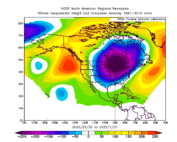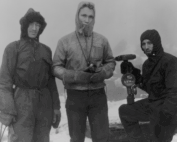Pressure 6288′ vs. -6288′
2012-01-09 19:25:41.000 – Rebecca Scholand, Operations Assistant
NULL
The summit of Mount Washington is known to be in the clouds about 60% of the year. This week was no different. The view out my desk window hardly reviled anything worthy of a picture. Rime ice had formed on portions of the window outside and through the thick glass looked like an aquarium of coral. I have not been to an aquarium in quite some time but it has always been a place I love to visit. I could just see all the tropical fish swimming in and out of the rime ice in schools of varying size exploring their tank. Inside I was really the one feeling like I was in a tank. I started to think how different things would be at 6,288′ below the ocean.
Knowing that sperm whales often venture as deep as 7,380′ below the sea for an hour or so at a time I wondered what they experience. After some research I discovered that pressure increases 68.45 millibars (mb) per ft. This means that whatever the sea level pressure at the time of their dive is their pressure is 433557.60mb more. In 2005 Pascal Bernabe set a world record dive depth of 1,082′ below the ocean. This would mean the following based on the current summit pressure… (drum roll please)
Summit of Mount Washington, 6,288′ = 797.61mb
Sea Level = 1006.30mb
Pascal Bernabe’s dive depth, 1,082′ = 75,610.20mb
Sperm whale at -6,288′ = 434,563.90mb!
Absolutely Incredible!
Sperm whale photo courtesy of National Geographic
Rebecca Scholand, Operations Assistant
A Labor of Love: How Volunteers Bring the Observatory’s Gardens to Life
A Labor of Love: How Volunteers Bring the Observatory’s Gardens to Life By Wendy Almeida If you've driven past the grounds of the Mount Washington Observatory’s North Conway office in spring or summer, chances
Going with the Flow: Why New England Didn’t Experience Any Classic Nor’easters This Winter
Going with the Flow: Why New England Didn’t Experience Any Classic Nor’easters This Winter By Peter Edwards Why didn’t the Northeast experience any major snowstorms this year? If I had to guess, it’s the
A Look at The Big Wind and Measuring Extreme Winds At Mount Washington
A Look at The Big Wind and Measuring Extreme Winds at Mount Washington By Alexis George Ninety-one years ago on April 12th, Mount Washington Observatory recorded a world-record wind speed of 231 mph. While




